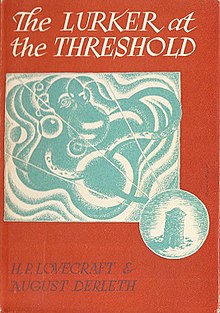The Lurker at the Threshold

Dust-jacket illustration by Ronald Clyne for The Lurker at the Threshold
|
|
| Author | August Derleth (inspired by fragments by H.P. Lovecraft) |
|---|---|
| Cover artist | Ronald Clyne |
| Country | United States |
| Language | English |
| Genre | Horror novel |
| Publisher | Arkham House |
|
Publication date
|
1945 |
| Media type | Print (Hardback) |
| Pages | 196 pp |
The Lurker at the Threshold is a short novel written by August Derleth, based on short fragments written by H. P. Lovecraft, who died in 1937, and published as a collaboration between the two authors. According to S. T. Joshi, of the novel's 50,000 words, 1,200 were written by Lovecraft.
The novel was originally published in 1945 by Arkham House in a hardcover edition of 3,041 copies, listed as the second (and final) volume in the "Library of Arkham House Novels of Fantasy and Terror". A British hardcover followed from Museum Press in 1948. The first British paperback was issued in 1970, with an American paperback published by Beagle Books in 1971. The novel has since been regularly reissued by Ballantine Books, then by Carroll & Graf. A French translation, Le rôdeur devant le seuil, appeared in 1973.
Lurker was included in The Watchers Out of Time and Others, the 1974 Arkham House omnibus edition of Derleth's stories credited as collaborations with Lovecraft (but excluded from similarly titled paperback editions compiling those stories).
"I constructed and wrote The Lurker at the Threshold ", Derleth acknowledged, "which had nowhere been laid out, planned, or plotted by Lovecraft". He elsewhere described the novel as "decidedly inferior work, since 9/10ths of it was written by me from Lovecraft’s notes".
Derleth reported using two Lovecraft fragments in writing the novel.S. T. Joshi, however, finds that while Derleth incorporated text from two Lovecraft fragments into the novel, "Of Evill Sorceries Done in New-England of Daemons in no Humane Shape" and "The Round Tower", he also used an untitled fragment, usually referred to as "The Rose Window", in framing his narrative. Derleth cited only the "Tower" and "Window" fragments in his account of his writing Lurker, although he drew on "Evill Sorceries" much more extensively. changing the date of the events described from 1684 to 1788.
E. F. Bleiler rated the novel as the best of Derleth's Lovecraft pastiches, but noted that "The New England background is not convincing, and the Lovecraft manner is not captured successfully."Baird Searles reviewed Lurker favorably, noting that although Derleth often made modern references that Lovecraft avoided, "the novel's atmosphere is still wonderfully sinister". Joshi wrote that Lurker "begins well, but it rapidly deteriorates into a naive good-versus-evil struggle between the Old Ones and the Elder Gods".
...
Wikipedia
